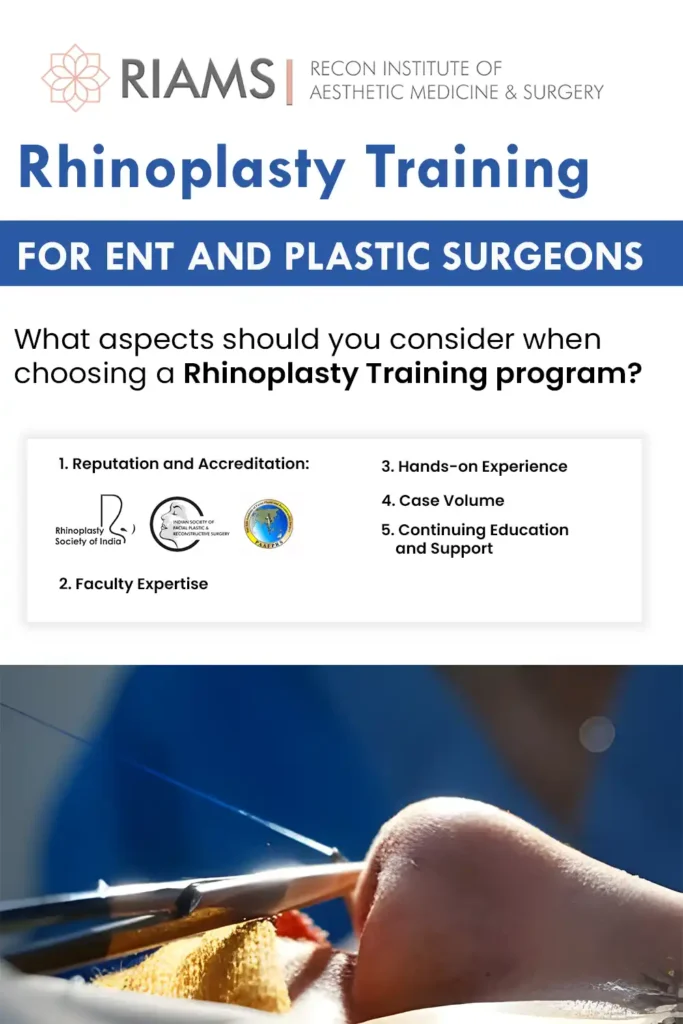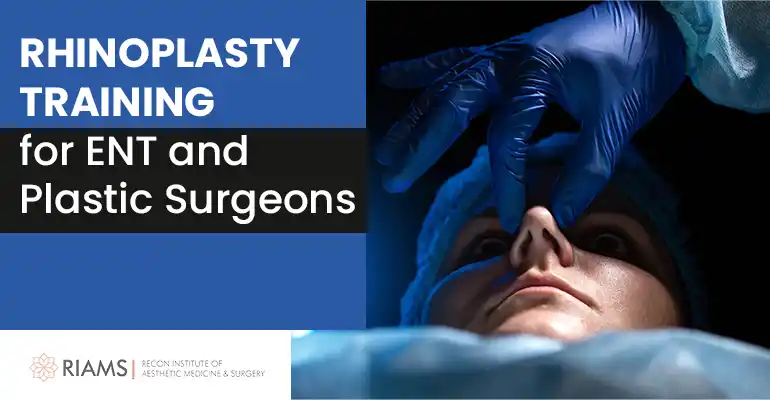Rhinoplasty Training for ENT and Plastic Surgeons
In the ever-evolving field of aesthetic surgery, the demand for proficient practitioners in Rhinoplasty continues to soar. Rhinoplasty goes beyond cosmetic enhancement—it encompasses intricate nasal anatomy considerations and functional improvements crucial for patient well-being. As interest and demand for Rhinoplasty increases, the importance for comprehensive training programs, tailored to equip surgeons with adept skills and expertise, becomes increasingly paramount. Let us explore the pivotal significance of high-quality training in Rhinoplasty and why settling for anything less jeopardises patient care and professional integrity.
Why Surgeons Should Undergo Specialised Rhinoplasty Training?
Commencing the journey in Rhinoplasty requires more than technical proficiency—it demands a profound understanding of nasal aesthetics, structural nuances and a patient-centred approach. Specialised Rhinoplasty training is instrumental in equipping aspiring surgeons with the indispensable knowledge and skills for success in this field.
At Recon Institute of Aesthetic Medicine & Surgery (RIAMS), we recognise the importance of comprehensive education in Rhinoplasty. Our curriculum, crafted by seasoned experts, transcends conventional training paradigms, offering an immersive exploration of all facets of rhinoplasty. Participants undergo rigorous operation theatre and live surgical demonstration-based training, aimed at addressing diverse patient needs with finesse and precision.
Through our specialised Rhinoplasty course, participants gain insights into nasal anatomy, aesthetic principles and patient assessment. By fostering a learning environment that encourages critical thinking and hands-on experience, we empower future Rhinoplasty surgeons to deliver exceptional care and achieve optimal outcomes for their patients.
What are the Pitfalls of Inadequate Rhinoplasty Training?
Undertaking Rhinoplasty without the requisite training is akin to navigating treacherous terrain without a map. Inexperienced surgeons not only jeopardise patient safety but also risk tarnishing their professional reputation. Suboptimal results and unforeseen complications have the potential to diminish the patient experience, often necessitating corrective interventions and further underlining the importance of investing in comprehensive training.
Inadequate training leaves surgeons ill-prepared to handle the intricacies of patient assessment, surgical planning, complications and post-operative care, fostering insecurity and incompetence. By prioritising top-tier training, surgeons can navigate the complexities of Rhinoplasty with confidence and assurance, ensuring the highest standards of patient care and professional integrity.
What aspects should you consider when choosing a Rhinoplasty Training program?

It’s essential to choose a Rhinoplasty training programs wisely to ensure you receive the best education and preparation for your surgical career. Here are some factors to consider:
- Reputation and Accreditation:
When considering Rhinoplasty training institutes, it is essential to prioritise those with a solid reputation and accreditation from reputable medical bodies. Accreditation ensures that the institute meets rigorous standards of education and training, providing assurance of quality and credibility.
Renowned for its commitment to delivering superior training programs, RIAMS is accredited by esteemed organisations such as the Pan Asia Academy of Facial Plastic & Reconstructive Surgery (PAAFPRS) and the Rhinoplasty Society of India (RSI), ensuring adherence to the highest standards of educational excellence and professional integrity. Our accreditation demonstrates our dedication to upholding excellence in Rhinoplasty education, ensuring optimal knowledge, skills and mentorship needed to thrive in this competitive field.
2. Faculty Expertise:
It’s very important to consider the qualifications and experience of the faculty members of the Rhinoplasty training program. Training under renowned rhinoplasty provides invaluable insights and mentorship, shaping your development as a surgeon. Distinguished faculty members bring a wealth of expertise and insights to a training program. By learning from them, participants can gain unique perspectives, refine their skills, and develop the confidence to excel in their Rhinoplasty practice.
At RIAMS, we pride ourselves on our panel of faculty of leading Rhinoplasty specialists. Among the esteemed Rhinoplasty faculty at RIAMS are:
Dr. Brajendra Baser (India), Dr. Lokesh Kumar (India), Dr. Ignazio Tasca (Italy), Dr. Miguel G. Ferreira (Portugal), Dr. Andres Gantous (Canada) and Dr. Anil Joshi (UK).
3.Hands-on Experience:
Practical experience is paramount in mastering surgical techniques, particularly in the intricate field of Rhinoplasty. A comprehensive training program should offer ample opportunities for hands-on learning across a spectrum of cases to ensure surgeons are well-prepared to handle diverse patient needs.
At RIAMS, we prioritise hands-on experience, offering participants the chance to engage in a wide range of surgical procedures and scenarios. Our program includes an extensive number of live surgeries covering various types of cases, including:
– Aesthetic rhinoplasty
– Augmentation rhinoplasty
– Reduction rhinoplasty
– Crooked nose rhinoplasty
– Tip rhinoplasty
– Revision rhinoplasty
– Congenital defect rhinoplasty (viz. Cleft, Binder’s syndrome)
4.Case Volume:
Exposure to a diverse range of cases is paramount for developing proficiency in Rhinoplasty. When selecting a training program, it is crucial to consider the case volume offered. Ensure that the course is attached to a successful Rhinoplasty practice. Recon Institute is uniquely positioned to offer exposure to a high volume of cases across various complexity levels.
Our course director, Dr. Pragati Shubha, leads a successful Rhinoplasty practice, ensuring access to a broad spectrum of patients for each course. Her expertise and clinical practice facilitate the availability of a diverse range of cases, allowing participants to refine their skills and adapt to different patient scenarios. This exposure not only enhances their surgical skills but also instils confidence in managing a wide array of Rhinoplasty cases post-training.
5. Continuing Education and Support:
RIAMS is committed to fostering a culture of lifelong learning among its graduates, offering access to conferences, workshops, and mentorship opportunities to stay abreast of the latest advancements in Rhinoplasty.
Moreover, Recon Institute provides continued mentorship and support to graduates, guiding them as they navigate their careers in Rhinoplasty. Our commitment to ongoing education ensures that our graduates remain at the forefront of their field, equipped with the knowledge and skills needed to deliver exceptional care to their patients.
In conclusion, the decision to undergo specialised Rhinoplasty training is not just about acquiring technical skills—it’s about investing in your future as a surgeon and prioritising the highest standards of patient care. By choosing a reputable training program like RIAMS and committing to lifelong learning, you can elevate your practice and make a meaningful impact in the field of aesthetic medicine and surgery.




